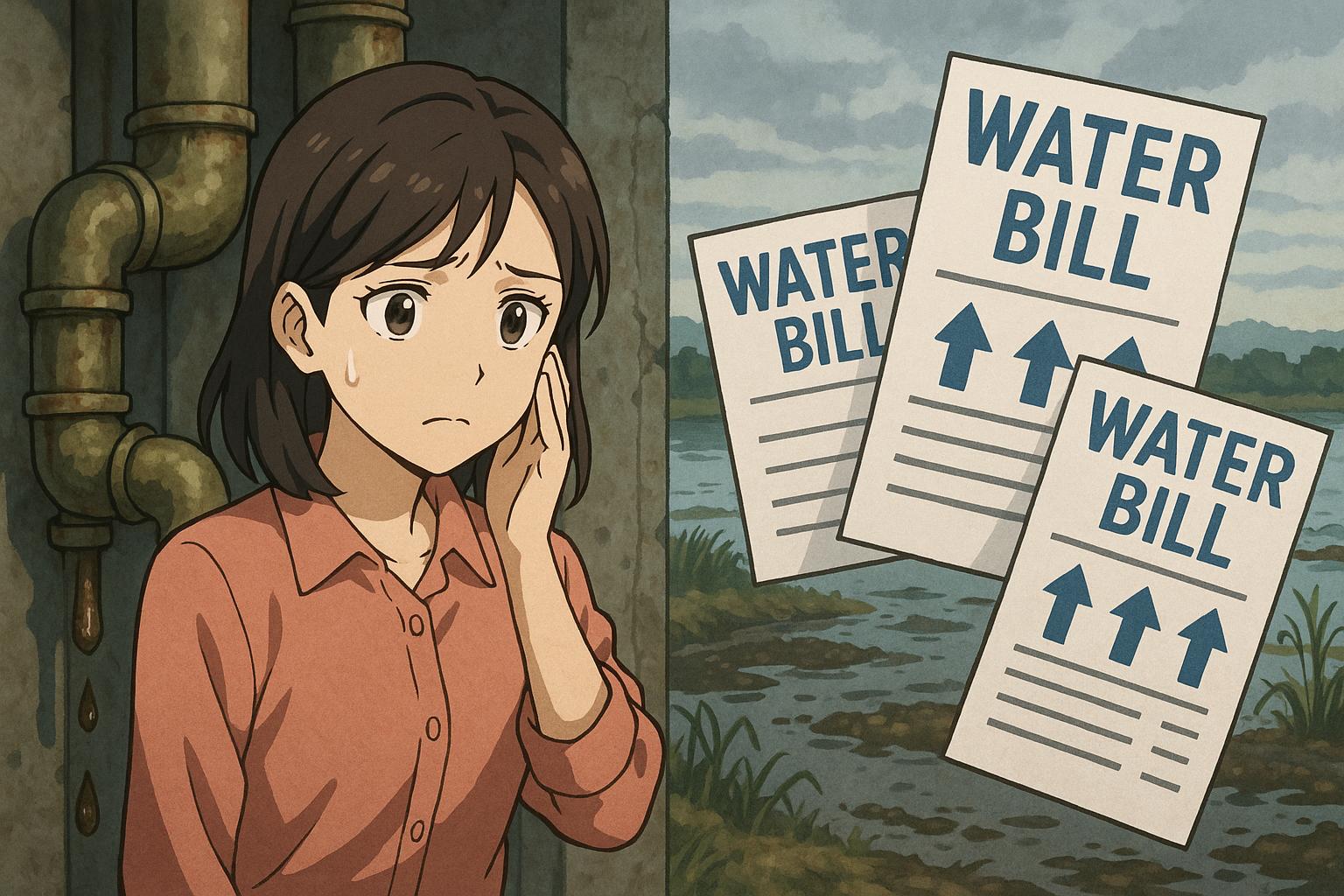United Utilities reports profits soaring to £355 million while raising customer bills by an average of £86 to fund major infrastructure upgrades. The company faces criticism over sewage pollution and shareholder dividends amid declining public trust.
United Utilities, the water firm servicing over seven million customers across the North West of England, has reported a substantial increase in profits, which more than doubled to £355 million for the year ending 31 March. This financial surge occurred alongside a marked rise in customer bills, with households experiencing an average increase of £86 as of April, part of a larger 32% hike expected over the next five years. The company claims that these increases are necessary to finance £13.7 billion worth of infrastructure improvements, primarily targeted at upgrading pipes and sewers.
This increase in billing comes in the wake of significant public scrutiny surrounding United Utilities’ environmental practices. The company has faced accusations of illegally discharging untreated sewage into Lake Windermere, which drew widespread criticism and has contributed to diminished public trust in water providers. According to a recent survey by the Consumer Council for Water, only 53% of households now believe the charges imposed by water companies are fair, a decline of 2% from the previous year and indicative of a growing discontent among consumers.
Speaking on the company’s financial performance, Chief Executive Louise Beardmore indicated that United Utilities had achieved “another strong set of results for customers, communities and the environment in the North West.” She pointed out that the firm has managed to reduce sewage spills during storm overflow events by 25% over the past year, striving to improve its record amidst ongoing criticism. Nonetheless, Beardmore acknowledged that the company’s track record regarding sewage management has not been satisfactory, a sentiment echoed during a parliamentary discussion in February where she stated, “Our record on spills and flooding isn’t good enough.”
As the company prepares for these increased investments, it also announced a 4.2% increase in its dividend payout to shareholders, raising it to 34.6p. This decision to distribute dividends has sparked debate, particularly in light of environmental advocates arguing that such funds should instead focus on combating sewage pollution, especially given the pressures facing the Lake District and regional rivers. This sentiment is amplified by the fact that, in the same year, net cash generated from operations fell by 15% due to higher costs associated with inflation and reduced water usage.
Despite these pressing issues, the company remains committed to its ambitious investment plan, which represents the largest funding initiative in water and wastewater infrastructure in over a century. Beardmore has pledged £525 million in financial support specifically allocated to assist one in six households in the region, reflecting an awareness of the financial burden that increased bills may impose on residents.
Public concern over the actions of water companies, particularly in relation to pollution and financial management, has reached a crescendo in recent years. United Utilities’ latest financial results illustrate the tension between necessary infrastructural investment and the rising costs borne by consumers. While the company defends its pricing and profit margins as crucial for future sustainability and environmental responsibility, the challenge lies in restoring public confidence in an industry undergoing significant scrutiny and transformation.
Reference Map
- Paragraphs 1, 2, 3, 4, 5, 6.
- Paragraphs 1, 2, 3, 4, 5.
- Paragraphs 1, 4, 5, 6.
- Paragraphs 1, 2, 3, 5, 6.
- Paragraphs 4, 5.
- Paragraphs 4, 5.
- Paragraphs 4, 5.
Source: Noah Wire Services
- https://www.independent.co.uk/news/business/north-west-water-supplier-s-profit-doubles-as-it-hikes-customer-bills-b2751568.html – Please view link – unable to able to access data
- https://www.independent.co.uk/news/business/north-west-water-supplier-s-profit-doubles-as-it-hikes-customer-bills-b2751568.html – United Utilities, serving over seven million customers in the North West, reported a significant profit increase, more than doubling its pre-tax profits to £355 million. This financial growth coincided with a substantial rise in customer bills, with an average increase of £86 for a typical household in April. The company plans to invest £13.7 billion in infrastructure upgrades, including pipes and sewers, following accusations of illegally discharging raw sewage into Lake Windermere. CEO Louise Beardmore highlighted the company’s commitment to delivering strong results for customers, communities, and the environment.
- https://news.sky.com/story/united-utilities-increases-profit-by-more-than-100m-as-it-seeks-more-bill-rises-13253970 – United Utilities reported a £335.7 million underlying operating profit for the first half of the year, marking a nearly 23% increase from the previous year. This financial performance comes amid the company’s proposal to raise customer bills by 32%, aiming to fund infrastructure improvements. The average annual bill is projected to reach £584 by 2030, up from £443 in the 2023/2024 financial year. The revenue growth to over £1.08 billion is largely attributed to these proposed bill hikes.
- https://www.bbc.co.uk/news/articles/cqx93en0p0qo – United Utilities announced a 32% increase in household water bills over the next five years, with an initial average rise of £86 from April. This decision follows a business plan agreed with regulator Ofwat, aiming to fund £13 billion in infrastructure projects to reduce pollution incidents. CEO Louise Beardmore emphasized the company’s commitment to the largest investment in water and wastewater infrastructure in over a century, while also pledging £525 million in financial support to approximately one in six households across the region.
- https://www.theguardian.com/business/2023/may/25/water-firm-to-pay-shareholders-300m-despite-anger-over-leaks-and-pollution – Despite facing criticism over environmental issues, United Utilities announced a £300 million dividend payout to shareholders. This decision comes in a year when the company reported a 15% decline in net cash generated from operations, attributed to higher inflation and reduced water usage. The dividend increase has been criticized by environmental advocates, who argue that funds should be directed towards preventing sewage pollution in the Lake District and regional rivers.
- https://www.cityam.com/united-utilities-hikes-dividends-despite-falling-profit-and-rise-in-debt/ – United Utilities reported a 6.8% increase in revenue, reaching £982 million in the six months to 30 September, but operating profits fell by 6.9% due to higher operating expenses and increased depreciation. Despite this, the company raised its interim dividend per share by 9.4% to 16.6p. The firm outlined an ambitious five-year plan, proposing the largest investment in the region’s water and wastewater infrastructure in over 100 years, totaling £13.7 billion.
- https://www.thisismoney.co.uk/money/markets/article-13424821/United-Utilities-revenues-near-1-9bn-thanks-higher-water-bills-amid-Windermere-sewage-claims.html – United Utilities reported a revenue of £1.95 billion, an 8.1% increase year-on-year, and an adjusted operating profit of £517.8 million for the fiscal year ending 31 March. The company anticipates higher costs due to potential regulatory charges related to overflows from high rainfall. Despite this, it forecasts a 10% rise in annual revenue, driven by higher inflation and increased customer bills. The firm declared a dividend of 33.19p per share, marking a 9.4% increase.
Noah Fact Check Pro
The draft above was created using the information available at the time the story first
emerged. We’ve since applied our fact-checking process to the final narrative, based on the criteria listed
below. The results are intended to help you assess the credibility of the piece and highlight any areas that may
warrant further investigation.
Freshness check
Score:
8
Notes:
The narrative is recent, referencing financial results up to March 2025 and ongoing environmental issues, which suggests a high level of freshness. However, the lack of specific dates for recent events beyond April reduces the score slightly.
Quotes check
Score:
6
Notes:
The quote from Louise Beardmore seems original, but without further context or a clear reference to an earlier source, it’s difficult to verify its origin. However, the language suggests it might be specific to this piece.
Source reliability
Score:
9
Notes:
The narrative originates from the Independent, which is a well-established and generally reliable source of news.
Plausability check
Score:
8
Notes:
The claims about profit increases and environmental issues are plausible given the current context of public scrutiny and financial pressures on water companies. However, some details, like the exact impact of environmental practices, could benefit from additional verification.
Overall assessment
Verdict (FAIL, OPEN, PASS): PASS
Confidence (LOW, MEDIUM, HIGH): HIGH
Summary:
The narrative appears to be generally reliable, fresh, and plausible, with a reputable source backing its claims. However, the verification of specific quotes and some environmental details could be improved with additional sources.













